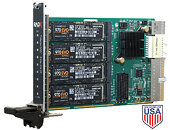- Joined
- Oct 9, 2007
- Messages
- 47,670 (7.43/day)
- Location
- Dublin, Ireland
| System Name | RBMK-1000 |
|---|---|
| Processor | AMD Ryzen 7 5700G |
| Motherboard | Gigabyte B550 AORUS Elite V2 |
| Cooling | DeepCool Gammax L240 V2 |
| Memory | 2x 16GB DDR4-3200 |
| Video Card(s) | Galax RTX 4070 Ti EX |
| Storage | Samsung 990 1TB |
| Display(s) | BenQ 1440p 60 Hz 27-inch |
| Case | Corsair Carbide 100R |
| Audio Device(s) | ASUS SupremeFX S1220A |
| Power Supply | Cooler Master MWE Gold 650W |
| Mouse | ASUS ROG Strix Impact |
| Keyboard | Gamdias Hermes E2 |
| Software | Windows 11 Pro |
TEVET, a premium test and measurement (T&M) supplier and RADX Technologies, an industry leading developer of modular, COTS, T&M solutions, today announced new 32 and 64 TB Trifecta-SSD COTS PXIe SSD RAID modules. The new models are the first NVMe SSD RAID modules supporting up to 7 GB/sec sequential read/write performance and up to 64 TB in a single PXIe hybrid or CPCIe slot. Manufactured in the USA by RADX and distributed exclusively by TEVET, Trifecta-SSD modules are available in 4, 8, 16, 32 and 64 TB capacities, with pricing that is typically over 2x more cost effective than other SSD RAID modules.

The new modules bring dramatically increased storage capabilities to PXIe-based systems for wideband single- and multi-channel T&M applications where high-fidelity signal recording and playback provide essential design, validation, and verification capabilities, including:
A high-fidelity 1 GHz RF signal results in 5 GB/sec or about 18 TB of data per hour. Historically, this level of data capacity and bandwidth required an external RAID system, adding cost and complexity while increasing T&M system size, weight and power (SWaP).
The new Trifecta-SSD models store up to 64 TB in a single-slot PXIe module - which reduces SWaP and which can easily be removed and secured for classified applications. Trifecta-SSD modules typically save users up to 200% in price per TB when compared to external RAID subsystems or other SSD RAID modules.
In addition, Trifecta-SSD 32 and 64 TB modules feature a unique 8-SSD architecture, which eliminates the "glitches" and performance degradation during sustained sequential write operations exhibited by 4-SSD RAID modules that rely on NVMe SSD write caches for enhanced sequential write performance.
"Trifecta-SSD provides an effective and scalable solution for implementing new PXIe-based systems or upgrading existing systems with RAID subsystems facing obsolescence," said Ross Q. Smith, CEO and co-founder of RADX. "Trifecta-SSD is the only single-slot SSD RAID solution that scales to 64 TB per slot and can truly replace external RAID solutions without compromising performance or capacity."
TEVET customers gain a distinct competitive advantage
TEVET is committed to procuring complete, reliable solutions for customers quickly and efficiently. By partnering with leading industry instrumentation developers like RADX, TEVET can help engineers using PXIe solutions for collecting and analyzing wideband signals.
"Our customers work with demanding, mission-critical applications, and need readily-available, reliable, streamlined technology," said Tracy Solomon, CEO of TEVET. "With Trifecta-SSD, customers now can record 16 times more data."
Pricing and availability
Pricing for the Trifecta-SSD PXIe-8M.2F-32 32 TB PXIe SSD RAID modules begins at $21,999 with Extended Endurance 32 TB Modules at $24,999 and 64 TB Modules at $34,999.
Trifecta-SSD modules are typically available with 30-day lead time.
View at TechPowerUp Main Site

The new modules bring dramatically increased storage capabilities to PXIe-based systems for wideband single- and multi-channel T&M applications where high-fidelity signal recording and playback provide essential design, validation, and verification capabilities, including:
- Advanced WiFi, 4G, and 5G MIMO silicon and systems
- Phased-array RADAR
- Electronic Warfare (EW)
- Autonomous vehicle sensor processing systems
A high-fidelity 1 GHz RF signal results in 5 GB/sec or about 18 TB of data per hour. Historically, this level of data capacity and bandwidth required an external RAID system, adding cost and complexity while increasing T&M system size, weight and power (SWaP).
The new Trifecta-SSD models store up to 64 TB in a single-slot PXIe module - which reduces SWaP and which can easily be removed and secured for classified applications. Trifecta-SSD modules typically save users up to 200% in price per TB when compared to external RAID subsystems or other SSD RAID modules.
In addition, Trifecta-SSD 32 and 64 TB modules feature a unique 8-SSD architecture, which eliminates the "glitches" and performance degradation during sustained sequential write operations exhibited by 4-SSD RAID modules that rely on NVMe SSD write caches for enhanced sequential write performance.
"Trifecta-SSD provides an effective and scalable solution for implementing new PXIe-based systems or upgrading existing systems with RAID subsystems facing obsolescence," said Ross Q. Smith, CEO and co-founder of RADX. "Trifecta-SSD is the only single-slot SSD RAID solution that scales to 64 TB per slot and can truly replace external RAID solutions without compromising performance or capacity."
TEVET customers gain a distinct competitive advantage
TEVET is committed to procuring complete, reliable solutions for customers quickly and efficiently. By partnering with leading industry instrumentation developers like RADX, TEVET can help engineers using PXIe solutions for collecting and analyzing wideband signals.
"Our customers work with demanding, mission-critical applications, and need readily-available, reliable, streamlined technology," said Tracy Solomon, CEO of TEVET. "With Trifecta-SSD, customers now can record 16 times more data."
Pricing and availability
Pricing for the Trifecta-SSD PXIe-8M.2F-32 32 TB PXIe SSD RAID modules begins at $21,999 with Extended Endurance 32 TB Modules at $24,999 and 64 TB Modules at $34,999.
Trifecta-SSD modules are typically available with 30-day lead time.
View at TechPowerUp Main Site




